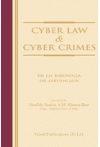- Author(s): Dr. J.N. Barowalia, Aarushi Jain
- Publisher: Vinod Publications (P) Ltd.
- Edition: 1 Ed 2022
- ISBN 13 9789391088095
- Approx. Pages 1216 + Contents
- Format Hardbound
- Approx. Product Size 24 x 16 cms
- Delivery Time 3-5 working days (within Kerala & South India) (Others 7-9 days)
- Shipping Charge Extra (see Shopping Cart)
............................................................................................
Description
The new millennium witnessed a transformation in the form of internet culture - a new culture which has changed our way of life. Internet has become an integral part of our day-to-day life and is being used as new means to communicate, to make friends, to chat, to talk, to send messages, to have social networking, to share news and views, to play games, to interact with the government and for e-commerce. The increased use of internet led to new class of crimes known as 'Cyber crimes' which can be described as crimes committed with the computer or through the computer in cyberspace and may include damaging the computer or the computer network, committing theft of computer data, computer software, unlawful access to computer data, blackmailing, credit/debit card frauds, stock transfers, electronic fund transfers, e-commerce frauds, hacking by theft of information, passwords, credit card numbers from the internet, giving threats, committing defamation, extortion, intimidation, etc. through e-mails, exposure of pornographic material, illegal gambling, pirated software, stolen data besides cyber stalking and cyber espionage. In India, to provide legal recognition for transactions carried out by means of electronic data interchange and other means of electronic communication, commonly referred to as "e-commerce", which involve the use of alternatives to paper-based methods of communication and storage of information, to facilitate electronic filing of documents with the Government agencies etc., commonly known as 'e-goverance', the Information Technology Act, 2000 (No. 21 of 2000) was enacted by Parliament which came into force w.e.f. 17th October, 2000. The Act has been amended by the Information Technology (Amendment) Act 55 of 2002, the Information Technology (Amendment) Act 10 of 2009 and Finance Act, 2017 (Act 7 of 2017). This Act is a comprehensive law to create an environment for effective use of the internet vis-à-vis technology for e-governance and e-commerce.
.........................................................................................
Contents
Chapter 1 : Introduction to Cyber Law with Special Reference to Information Technology Act
Chapter 2 : Important Definitions under Cyber Law
Chapter 3 : Cyber Law Vis-a-Vis Right to privacy
Chapter 4 : Cyber Law and Electronic Record
Chapter 5 : Electronic Governance (e-Governance)
Chapter 6 : Electronic Commerce (e-Commerce)
Chapter 7 : penalties and Compensation
Chapter 8 : Electronic Evidence
Chapter 9 : Cyber Crimes - Offences and Punishments
Chapter 10 : Cyber Law - Special Provisions qua Intermediators
Chapter 11 : Cyber Law Vis-a-Vis Intellectual Property Rights
Appendices
A. Important Acts and the Amendments
B. Rules Framed under the Act
C. Policy Documents of Government of India
D. Regulations Framed under the Act
E. International Model Law on Electronic Commerce and Conventions
F. IT Laws of Other Countries
............................................................................................
Author Details
Dr. J.N. Barowalia, an eminent jurist, had a brilliant academic record and obtained his B.A. degree from Punjab University by securing first position in his college and LL.B. degree from Himachal Pradesh University in the first division. He had the distinction of having Ph.D. in Economics.Dr. Barowalia topped in the Himachal Pradesh Judicial Services Competitive Examination held in 1975 and served as Sub Judge-cum-Judicial Magistrate-cum-Rent Controller from July 1976 to June 1984; as Senior Sub Judge-cum-Chief Judicial Magistrate of Lahaul Spiti, Kangra and Mandi Districts from July 1984 to October 1994; and since April 1995 he is working in Higher Judicial Service. He had served as District and Sessions Judge, Incharge of Kullu and Lahaul Sessions Division (1997-1999), District & Sessions Judge, Incharge Una Sessions Division (1999-2001), District & Sessions Judge, Incharge Kangra Sessions Division at Dharamsala (2001-2002); President, District Consumer Forum, Shimla (2002-2003) and since June 2003 he is working as Principal Secretary to Hon'ble Chief Justice-cum-Registrar, High Court of Himachal Pradesh, Shimla. Dr. Barowalia represents that classical breed of judicial officers who are inclined to proceed beyond the limited confines of daily judicial work into the broadening experiences of multi-dimensional intellectual activity. His books titled 'Commentary on the Narcotic Drugs & Psychotropic Substances Act', 'Commentary on the Himachal Pradesh Land Revenue Act', 'Commentary on the Himachal Pradesh Panchayati Raj Act' and the 'Commentary on the Consumer Protection Act', have received overwhelming response from judges, advocates and the students of law alike. He is a guest faculty of the S.V.P. National Police Academy, Hyderabad, Institute of Public Administration, Shimla and Himachal Pradesh State Judicial Academy, Shimla. Dr. Barowalia has been called upon to deliver lectures on the subjects of land disputes and consumer protection in various seminars and workshops. He has also been invited to deliver lectures on "Drug Laws", "Management of Drug Abuse" and "Drug Abuse and AIDS" in the National and State level seminars and workshops held at Hyderabad, Shimla, Mumbai and Gauhati and is actively involved in the campaign against "Drug Abuse and AIDS" in India.
DR. Aarushi Jain, M.A. (Pub. Admn. and H.R.), Ph.D, Associate Director, Bharti Institute of Public Policy, Indian School of Business

